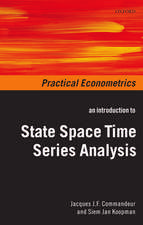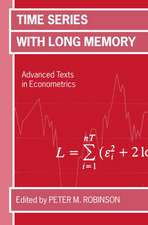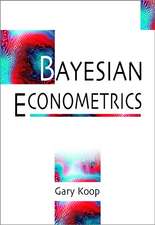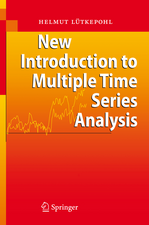What Mathematics Can Do for You: Essays and Tips from Japanese Industry Leaders
Editat de Yoshikazu Giga, Toshiyuki Kobayashien Limba Engleză Paperback – 24 iun 2015
This book is a first attempt to ask leaders of top Japanese companies, such as Toyota, about their thoughts on mathematics. The topics range from mathematical problems in specific areas (e.g., exploration of natural resources, communication networks, finance) to mathematical strategy that helps a leader who has to weigh many different issues and make decisions in a timely manner, and even to mathematical literacy that ensures quality control. The reader may notice that every article reflects the authors’ way of life and thinking, which can be evident in even one sentence.
This book is an enlarged English edition of the Japanese book What Mathematics Can Do for You: Essays and Tips from Japanese Industry Leaders. In this edition we have invited the contributions of three mathematicians who have been working to expand and strengthen the interaction between mathematics and industry.
The role of mathematics is usually invisible when it is applied effectively and smoothly in science and technology, and mathematical strategy is often hidden when it is used properly and successfully. The business leaders in successful top Japanese companies are well aware of this invisible feature of mathematics in applications aside from the intrinsic depth of mathematics. What Mathematics Can Do forYou ultimately provides the reader an opportunity to notice what is hidden but key to business strategy.
| Toate formatele și edițiile | Preț | Express |
|---|---|---|
| Paperback (1) | 413.01 lei 6-8 săpt. | |
| Springer – 24 iun 2015 | 413.01 lei 6-8 săpt. | |
| Hardback (1) | 418.78 lei 6-8 săpt. | |
| Springer – 31 mai 2013 | 418.78 lei 6-8 săpt. |
Preț: 413.01 lei
Nou
Puncte Express: 620
Preț estimativ în valută:
79.04€ • 82.21$ • 65.25£
79.04€ • 82.21$ • 65.25£
Carte tipărită la comandă
Livrare economică 12-26 aprilie
Preluare comenzi: 021 569.72.76
Specificații
ISBN-13: 9784431546818
ISBN-10: 4431546812
Pagini: 156
Ilustrații: VIII, 146 p.
Dimensiuni: 155 x 235 x 8 mm
Greutate: 0.23 kg
Ediția:2013
Editura: Springer
Colecția Springer
Locul publicării:Tokyo, Japan
ISBN-10: 4431546812
Pagini: 156
Ilustrații: VIII, 146 p.
Dimensiuni: 155 x 235 x 8 mm
Greutate: 0.23 kg
Ediția:2013
Editura: Springer
Colecția Springer
Locul publicării:Tokyo, Japan
Public țintă
Professional/practitionerCuprins
Toshiyuki Kobayashi and Fujio Cho (Chairman, TOYOTA), A Dialogue between a Mathematician and TOYOTA's Chairman: Think, think, and think again. Yusuke Yasuda (BNP Paribas Tokyo), Reasons Why Mathematics Is Important to Our Company. Yasuchika Hasegawa (CEO, Takeda Pharma) Are Numbers Useful? Acknowledging the Contribution of Mathematical Modeling to Corporate Management. Norio Wada (Chairman, NTT), Mathematics Drives the Economy. Kenichi Watanabe (CEO, Nomura Holdings), The Role of Mathematics in Finance: Applied Mathematics and Risk. Atsushi Horiba (CEO, HORIBA), Mathematics Is the Starting Point of Corporate Culture.Eisuke Masada (President, RTRI), Mathematics Supports Development of Railway System Technology.Hirobumi Kawano (President, JOGMEC), The role of mathematics in the petroleum and natural gas exploitation industry in Japan.Waro Iwane (President, Iwane Labo), Mathematics in Our Company: What does it describe? Kaoru Yosano (Former Minister of Finance, Japan), Mathematics and I. Masahiro Yamamoto (Professor, U Tokyo), Mathematics for industry - principle, reality, practice, from a viewpoint of a mathematician. Masato Wakayama (Director, Math-for-Industry, Japan), Importance and Unpredictable Effectiveness of Mathematics in the Real World and for Industry. Hiroshi Fujita (Professor Emeritus, U Tokyo), Mathematics for Business and Business Leaders Based on Mathematical Intelligence.
Notă biografică
Yoshikazu Giga is a Professor of Mathematics at the University of Tokyo and one of the leading experts in mathematical analysis for nonlinear parabolic partial differential equations. His research interests include analysis on the Navier-Stokes equations, blow-up phenomena for semilinear heat equations, surface evolution equations, and viscosity solutions. His previous books include "Surface Evolution Equations" (Birkhaeuser 2006) and "Nonlinear Partial Differential Equations"(with M. Giga and J. Saal, Birkhaeuser 2010). He has been awarded the MSJ Autumn Prize and the Medal with Purple Ribbon.
Toshiyuki Kobayashi, a mathematician, was born in 1962. When he was 25, he published the article on the necessary and sufficient condition for Calabi-Markus Phenomenon, which led to a new theory of discontinuous groups beyond the framework of Riemannian geometry. He was invited by Institute for Advanced Study, Princeton, for his world first accomplishment. His achievements in later career consists of many new theories of mathematics, such as the theory of discrete decomposable branching laws on infinite-dimensional spaces and visible actions on the unified theory of multiplicity-free representation, to name a few. His academic honors and awards include Spring Prize (the Mathematical Society of Japan), Osaka Science Prize, JSPS Prize (the Japan Society for the Promotion of Science), Sackler Distinguished Lecturer (Israel) and Humboldt Research Award (Germany). After working as a professor of Research Institute for Mathematical Sciences (RIMS) in Kyoto University and as a visiting professor of Harvard University, he was appointed to the University of Tokyo’s Graduate School of Mathematical Sciences. He is also working as Principal Investigator of Kavli Institute for the Physics and Mathematics of the Universe (Kavli IPMU), the University of Tokyo.
Toshiyuki Kobayashi, a mathematician, was born in 1962. When he was 25, he published the article on the necessary and sufficient condition for Calabi-Markus Phenomenon, which led to a new theory of discontinuous groups beyond the framework of Riemannian geometry. He was invited by Institute for Advanced Study, Princeton, for his world first accomplishment. His achievements in later career consists of many new theories of mathematics, such as the theory of discrete decomposable branching laws on infinite-dimensional spaces and visible actions on the unified theory of multiplicity-free representation, to name a few. His academic honors and awards include Spring Prize (the Mathematical Society of Japan), Osaka Science Prize, JSPS Prize (the Japan Society for the Promotion of Science), Sackler Distinguished Lecturer (Israel) and Humboldt Research Award (Germany). After working as a professor of Research Institute for Mathematical Sciences (RIMS) in Kyoto University and as a visiting professor of Harvard University, he was appointed to the University of Tokyo’s Graduate School of Mathematical Sciences. He is also working as Principal Investigator of Kavli Institute for the Physics and Mathematics of the Universe (Kavli IPMU), the University of Tokyo.
Textul de pe ultima copertă
Japan is a tiny country that occupies only 0.25% of the world’s total land area. However, this small country is the world’s third largest in economy: the Japanese GDP is roughly equivalent to the sum of any two major countries in Europe as of 2012.
This book is a first attempt to ask leaders of top Japanese companies, such as Toyota, about their thoughts on mathematics. The topics range from mathematical problems in specific areas (e.g., exploration of natural resources, communication networks, finance) to mathematical strategy that helps a leader who has to weigh many different issues and make decisions in a timely manner, and even to mathematical literacy that ensures quality control. The reader may notice that every article reflects the authors’ way of life and thinking, which can be evident in even one sentence.
This book is an enlarged English edition of the Japanese book What Mathematics Can Do for You: Essays and Tips from Japanese Industry Leaders. In this edition we have invited the contributions of three mathematicians who have been working to expand and strengthen the interaction between mathematics and industry.
The role of mathematics is usually invisible when it is applied effectively and smoothly in science and technology, and mathematical strategy is often hidden when it is used properly and successfully. The business leaders in successful top Japanese companies are well aware of this invisible feature of mathematics in applications aside from the intrinsic depth of mathematics. What Mathematics Can Do forYou ultimately provides the reader an opportunity to notice what is hidden but key to business strategy.
This book is a first attempt to ask leaders of top Japanese companies, such as Toyota, about their thoughts on mathematics. The topics range from mathematical problems in specific areas (e.g., exploration of natural resources, communication networks, finance) to mathematical strategy that helps a leader who has to weigh many different issues and make decisions in a timely manner, and even to mathematical literacy that ensures quality control. The reader may notice that every article reflects the authors’ way of life and thinking, which can be evident in even one sentence.
This book is an enlarged English edition of the Japanese book What Mathematics Can Do for You: Essays and Tips from Japanese Industry Leaders. In this edition we have invited the contributions of three mathematicians who have been working to expand and strengthen the interaction between mathematics and industry.
The role of mathematics is usually invisible when it is applied effectively and smoothly in science and technology, and mathematical strategy is often hidden when it is used properly and successfully. The business leaders in successful top Japanese companies are well aware of this invisible feature of mathematics in applications aside from the intrinsic depth of mathematics. What Mathematics Can Do forYou ultimately provides the reader an opportunity to notice what is hidden but key to business strategy.
Caracteristici
The first book in English to present Japan’s top business leaders’ thoughts on mathematics All authors were selected as representatives of their respective industries, e.g., the head of Toyota for the automobile industry This book encourages young professionals starting out in industry to study mathematics for success in business


















